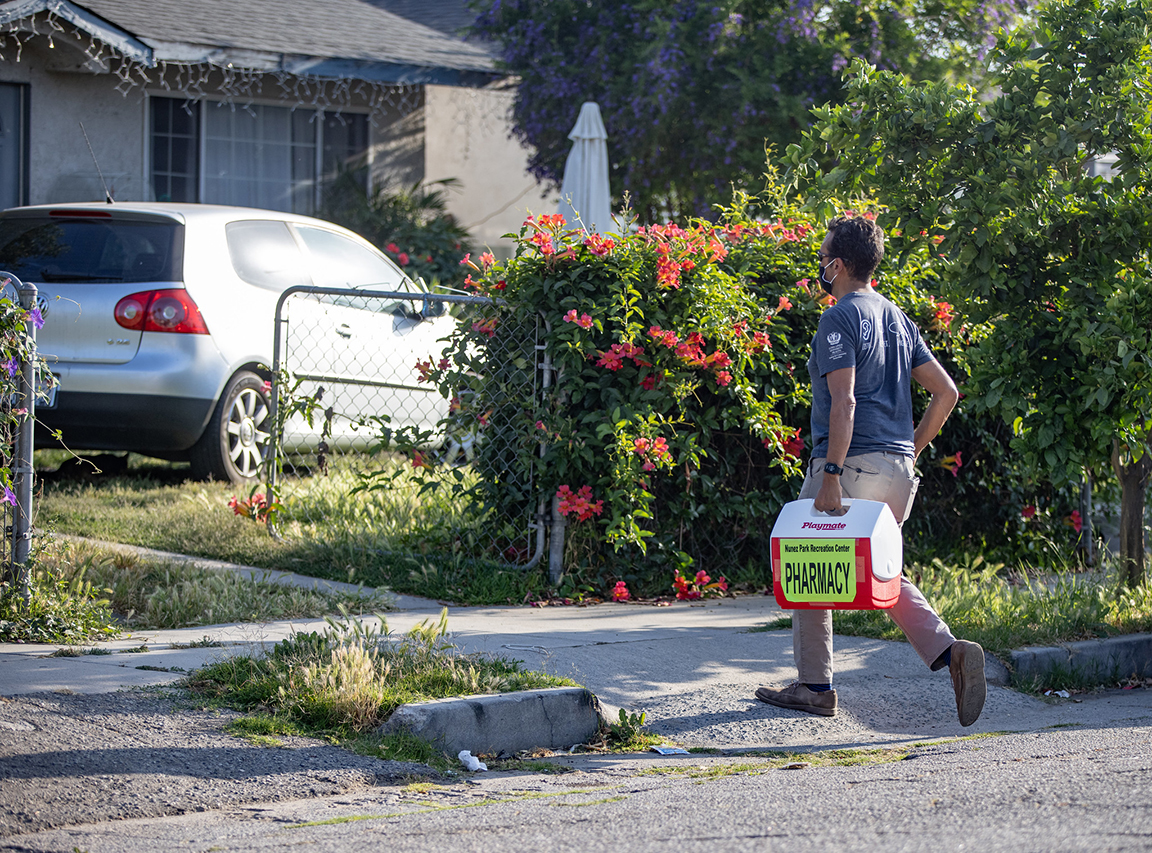
Loma Linda University School of Pharmacy has received a $20,000 grant to mobilize vaccine teams, delivering COVID-19 vaccines to minority populations living in Southern California. The award was presented during the 26th annual National Association of Chain Drug Stores (NACDS) Foundation Scholarship Program, held earlier this month.
The NACDS Foundation promotes diversity and innovation in pharmacy education in under-represented populations.
This year, the NACDS Foundation received more than 40 scholarship applications from schools and colleges of pharmacy from across the country. LLUSP was one of five awarded with an innovation track scholarship.
The NACDS Foundation Scholarship Program is designed to fund prospective projects that have the potential to significantly advance patient care. Accredited colleges and schools of pharmacy were asked to submit applications for projects that may include community-based research projects and patient-centered coursework, or other innovative curricula.
“The COVID-19 pandemic continues to shed light on the health inequities and disparities that exist in our country and disproportionately affect some of the most at-risk populations facing health threats and limited access to health and wellness — and these upcoming educational initiatives are helping to serve as solutions to these critical issues,” said NACDS Foundation President Sara Roszak.
Michael Hogue, PharmD, FAPhA, FNAP, dean of LLU School of Pharmacy, has played an integral role in establishing clinics in line with the Centers for Disease Control and Prevention and California state guidelines and says the grant funds will be used to organize interprofessional teams of students, staff, and faculty to administer COVID-19 vaccines in vulnerable communities throughout Southern California.
“We anticipate immunizing approximately 100 people per week through these mobile teams; and while this number does not sound significant, it is extremely important given the level of vulnerability the population we are targeting is facing during the pandemic," Hogue said. "These are among the highest risk persons of society who are impacted by social determinants on healthcare.”
Each team will include two students from pharmacy and a medicine or nursing student, along with a preceptor, as well as a Spanish-language translator — who is also a community health worker or “Promotora.” Hogue says all students will be trained in effective techniques for reducing vaccine hesitancy.
Loma Linda University’s Institute for Community Partnerships (ICP), in partnership with El Sol Neighborhood Educational Center and the San Bernardino Department of Public Health, will provide a map of targeted communities, where four to six vaccine teams will be sent out to reach the residences within specified neighborhoods. Teams will also visit homeless encampments and engage with those living on the streets of San Bernardino to optimize vaccination opportunities among the most vulnerable populations.
“LLUSP will send out teams at least once each week for as long as the declared pandemic continues,” Hogue said.
Nearly 80,000 doses of COVID-19 vaccine have been administered through interprofessional clinics by Loma Linda University students of pharmacy, nursing, respiratory therapy, dentistry, physician assistant studies, and medicine, according to Hogue.
Loma Linda University Health led the largest student-based volunteer vaccination clinic in California. The clinic’s efforts have been recognized through an official gubernatorial visit from California Governor Gavin Newsom, as well as by U.S. Congressional representatives.
Hogue says May saw a substantial decrease in the number of people seeking vaccination through LLUH’s mass vaccination clinics. “We formed a new strategy to operate mobile vaccine clinics as a way to reach those who may not have transportation to a clinic or internet access to make an appointment online,” he said.
Eight one-day popup vaccine clinics delivered 373 COVID-19 vaccines to San Bernardino County’s Black and Latinx populations on May 14. The initiative was part of an ongoing focused equity effort to reach minority populations, which have experienced higher rates of COVID-19 infection during the pandemic, according to the CDC.
On the same day, volunteer teams, carried portable coolers full of vaccines into nearby neighborhoods, offering people at local businesses and inside homeless encampments an opportunity to be vaccinated.
“The foundation for this vaccination model is rooted in the effort, in the mid-1950s, to wipe out polio,” Hogue said. “Its success necessitated a house-to-house, person-by-person approach to vaccination in order to reach eradication in the United States."
“The NACDS Foundation grant will allow us to use this engagement model to reach the lowest quartiles identified in the Public Health Alliance of Southern California’s Healthy Places Index, improving vaccine access and vaccination rates,” he said.
This is the second time this year Loma Linda University School of Pharmacy has been recognized nationally for the school’s community outreach during the pandemic. LLUSP received the “Rookie Award” at the 10th annual 2021 Medication Adherence Team Challenge, in July.
